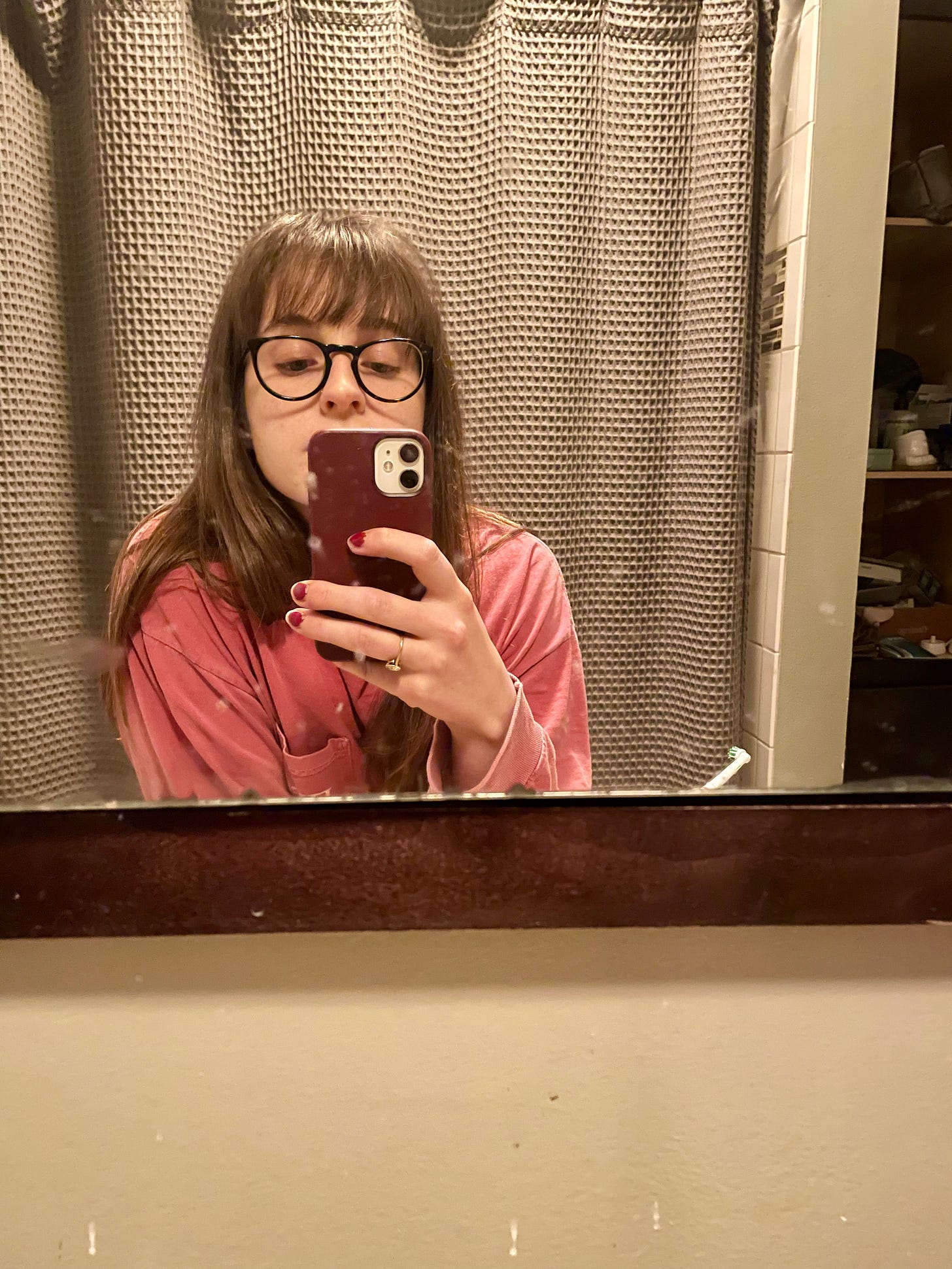Last week, I explored my impulse to travel. I get caught up in the difficulty of explaining a feeling. How can I describe an urge, or a need, in a way that someone else can feel it too? In what ways can a fear of stasis, or a boredom of sameness, inspire change? For me, it’s booking a flight. The idea of being somewhere else gives me a rush of dopamine. For others, maybe it’s getting a tattoo, or a home improvement project, like in Alison Roman’s case. She writes:
While I haven’t had bangs since I was in my early 20’s, I frequently have the urge to “get bangs.” I don’t mean literally get bangs (this face could never), I mean something I can do that’s in my control at this very moment that will have a relatively meaningless yet immediate and significant impact.
Yesterday, while I didn’t actually get bangs, I “got bangs” when I manically removed all the hardware of my old IKEA cabinets, then took it one step further by removing two of the cabinets themselves. I love using a power drill, it gives me a fantastic sense of accomplishment.
Rory Gilmore gets bangs after she steals a yacht and subsequently leans on the support of her grandparents, Emily and Richard. She moves into their home, the same home her mother, Lorelai, ran away from as a sixteen-year-old girl. Rory drops out of Yale and begins working at the DAR with Emily. She fights with her mother/best friend, and Lorelai struggles to accept her daughter’s departure from the role she had always played: the good kid.
I’m almost 13 years old when Rory gets bangs. People on the internet love to hate Rory, but I’ve always idolized her. Gilmore Girls has remained a fixture in my life, and even though I’m closer in age to Lorelai (gasps), I still resonate the most with Rory.
On Thursday, when my hairstylist asked that chirpy question ubiquitous to salons, what are we looking to do today?, I turned my phone around to show her this iconic look:
Reader, I got bangs.
***
The trajectory of Rory’s life in the period leading up to her bangs moment is a perfect example of the wider cultural trope that plagues the hairstyle. Kaitlyn Tiffany writes for The Atlantic:
…this truth universally known but slightly less frequently acknowledged: Cutting off the front of your hair is the ultimate expression of self-delusion, a desperate attempt to right something deeply wrong—with a pair of scissors.
People get break-up bangs and breakdown bangs. If bangs are an outward symbol of brokenness, does this mean I’m broken somehow? (And if I don’t think I am, does this mean I’m not looking hard enough?)
***
Before my haircut, I described bangs as a “regrettable” haircut. I’d understood cutting bangs to be something might feel good in the moment, but usually “looks bad” and is awkward to grow out. An impulsive decision with a long-drawn-out consequence. I’d never gotten bangs before because it’s the type of risk I’d never take. I’m precious about how others perceive me. I possess an acute sensitivity to patriarchal beauty standards—to be smaller, more feminine, more lithe. Let’s call it vanity. Somewhere, maybe I had an idea of myself, but she kept getting shoved aside by the versions of me other people held. Bangs would sever my likeness with my former self. God, they might even look terrible (they probably would). How could I ever consider getting bangs?
I’m not writing this in order to justify my decision to you, or to make you more comfortable. I don’t think that my one small haircut will change the wider perception of bangs as a cry for help, or internet punchline.
But I love my haircut, and for the first time, I care a little bit less if you love it, too. On Thursday when I came home, I had a full-blown photoshoot. I made faces in the mirror and allowed a softness, something like acceptance, towards my physical self. I texted my friend that day: I feel new and I feel obsessed with myself. I’m savoring the newness. They replied the following day: I got a tattoo yesterday evening and thought of your pride and obsession, the pleasure of choosing and choosing right.
I cherish their words: the pleasure of choosing and choosing right. I think about all of the choices about my appearance that I felt like I could never make; the choices that were already made for me by the pressure to conform to a version of myself that would be best perceived. The most attractive, or most feminine, or most ‘like myself,’ the self I’d always presented to others. Today, I hold on to that pleasure, and to the magic that comes when I choose to change how I look, rather than grieve the changes that happen even when I try to stay the same.







I like!!